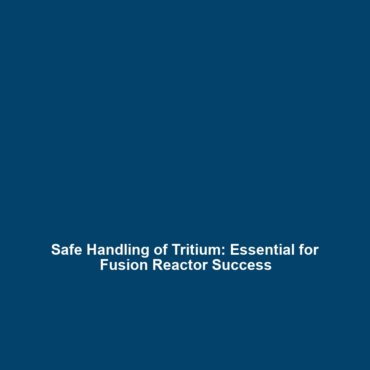<>
Safety and Handling of Tritium in Fusion Energy
The importance of safety and handling practices associated with tritium in fusion energy cannot be overstated. As a mildly radioactive isotope, tritium is not only essential in fusion reactions but also presents unique challenges in terms of storage, handling, and recycling. This article delves into the significance of effectively managing tritium to ensure the safe advancement of fusion energy technologies, providing insights into its applications and the current landscape of challenges faced in the field.
Key Concepts
Tritium is a key player in the pursuit of clean and sustainable fusion energy. Here are some major concepts related to the safety and handling of tritium:
- Mild Radioactivity: Tritium emits low levels of radiation, which require careful monitoring and handling protocols to mitigate risks.
- Storage Solutions: Tritium must be stored in secure and controlled environments to prevent leakage and ensure safety.
- Recycling Practices: Efficient recycling methods are essential to minimize waste and maximize the availability of tritium in fusion reactors.
Applications and Real-World Uses
Understanding how tritium is used in fusion energy highlights its significance:
- Fusion Reactors: Tritium serves as a fuel source in fusion reactions, particularly in experimental reactors like ITER, where it plays a crucial role in achieving and maintaining fusion conditions.
- Radioisotope Thermoelectric Generators (RTGs): Tritium is used in specialized applications such as RTGs, providing a reliable power source for space missions and remote sensors.
- Medical Imaging: Tritium labeling is utilized in radiolabeling techniques to enhance imaging in biomedical research.
Current Challenges
Despite its potential, the management of tritium presents several challenges within the scope of fusion energy:
- Environmental Concerns: Tritium leakage can pose environmental risks, prompting the need for stringent safety measures.
- Limitations in Recycling: Current recycling processes for tritium are not fully efficient, leading to challenges in sustainable fuel management.
- Public Perception: Misinformation regarding the safety of handling tritium can affect public support for fusion energy initiatives.
Future Research and Innovations
Ongoing research is crucial for developing innovative solutions to enhance the safety and handling of tritium:
- Advanced Containment Systems: Novel containment technologies are being developed to improve tritium storage and reduce the risk of leakage.
- New Recycling Techniques: Research into more efficient recycling methods could significantly impact the sustainability of tritium supply.
- Public Engagement Strategies: Efforts to accurately inform the public about tritium safety are essential for maintaining support for fusion energy.
Conclusion
In summary, the safe handling, storage, and recycling of tritium are crucial elements in the advancement of fusion energy technologies. As the world moves toward a more sustainable energy future, addressing the associated challenges and leveraging new innovations will be vital for the success of fusion reactors. For further reading on fusion energy advancements, consider visiting our sections on current research in fusion technology and fusion energy challenges.
